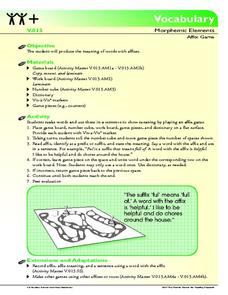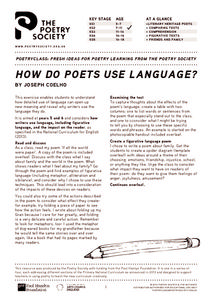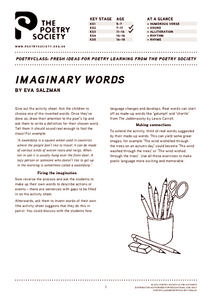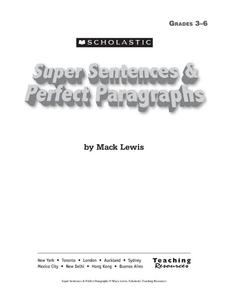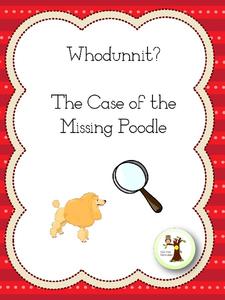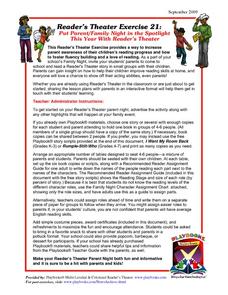Have Fun Teaching
Identifying Author's Purpose
The multi-lesson, 47-page packet contains everything you need to ensure kids can recognize the clues provided to identify the type of text, the intended audience, and the author's purpose in writing the passage.
Evan-Moor
Daily Handwriting Practice: Traditional Cursive
Keep your class practicing handwriting each day in a 36-week school year with this comprehensive resource that combines daily cursive practice with content such as poetry, geography facts, continents, and much more.
Crafting Freedom
Harriet Jabocs and Elizabeth Keckly: The Material and Emotional Realities of Childhood in Slavery
Through the journals written by Harriet Jacobs and Elizabeth Keckly, young readers gain insight into the lives of two enslaved children on nineteenth-century plantations.
Project Noah
Writing Goes Wild
Young scientists develop their observation and writing skills as they craft and then post a detailed description of a plant or animal they have spotted and photographed.
Florida Center for Reading Research
Vocabulary Morphemic Elements: Affix Game
How well do you know your affixes? Find out how proficient your learners are with a game that requires them to define various affixes and use them to create words that will go into sentences.
MENSA Education & Research Foundation
It’s Greek to Me: Greek Mythology
Designed as extension exercises in homeschool or classroom settings, as well as for individual work, the ideas in this packet are sure to engage learners in an investigation of Greek mythology.
Briscoe Center for American History
Applying the SOAPS Method of Analyzing Historical Documents
Young historians use the SOAPS (Speaker, Occasion, Audience, Purpose, Subject) method of questioning to determine the historical value of primary source documents. The third in a series of five lessons that model for learners how...
Scholastic
Step-by-Step Strategies for Teaching Expository Writing
A carefully crafted, logically organized, 128-page packet is an excellent addition to your unit on expository writing.
Poetry Class
Eccentricity and Sound
What do Lady Gaga and Dame Edith Sitwell have in common? As they examine Sitwell's poetry, class members learn that the similarities are far more than their unique appearance.
Poetry Society
How do Poets Use Language?
Why do writers choose the language they do? Here's a resource that has the poet himself answer that very question. Joseph Coelho explains why he chose the words and images he used in his poem, "If All the World Were Paper."
Poetry Society
Simile and Metaphor
Young poets use word cards to prompt a metaphor poem comparing to very dissimilar items.
Poetry Society
A Conceit Poem
Young writers needn't be self-involved to craft a conceit. Directions for how to craft this form of extended metaphor, models, and a worksheet are all included in the packet.
Poetry Society
Imaginary Words
Oh, what fun! Young logophiles and neologists create a dictionary-sounding definition for imaginary words and try to fool their classmates.
Teacher's Corner
Tanka
The Tanka, another fix from of Japanese poetry, is featured in the final exercise in a 10-part series of poetry writing activities.
Teacher's Corner
Diamonte (dee-a-MON-tay)
Did you say a diamonte? Ask your young poets to craft and polish this gem of a form poem. The fifth in a series of ten poetry writing exercises.
Teacher's Corner
Cinquain (sink-ain)
The cinquain, a five line, fixed-form poem that features one subject, is the focus of the third exercise in a series of ten poetry writing resources.
Teacher's Corner
Alliteration
Calliope calls kids to craft clever creations in this, the second in a series of ten poetry sessions.
Curated OER
Poetry Assignment
As the culminating activity in a unit study of poetry, class members demonstrate what they have learned about poetry by creating a notebook containing original poems they have written, published poems they enjoy, and analyses of these...
Curated OER
Mandala Portfolio Project
Here's a great idea for writing portfolios. Kids decorate all four sides of their portfolio, introducing themselves, their families, goals, dreams, and favorite things. Detailed directions for all four panels and a rubric are included in...
Scholastic
Super Sentences & Perfect Paragraphs
An extensive collection of lessons and activities includes many writing, grammar, and proofreading exercises. With templates and worksheets that cover several steps in the writing process, from sentence to paragraph to essay, this...
Tick Tock Curriculum
Whodunnit? The Case of the Missing Poodle
Who purloined the poodle? Class groups read police reports and theorize whodunnit. The sixth of a ten-lesson series on mysteries.
Playbooks
Reader's Theater Exercise
Here's a great idea for your Parent/Family Night—host a Reader's Theater! Everything you need to organize the night, as well as a K-3 and a 4-7 script, is provided in the packet.
Playbooks
Reader's Theater Exercise: The Night Before Christmas
Yes, Virginia, there really is a reader's theater script for "The Night Before Christmas." The exercise is a great way to productively channel pre-holiday energy.
Montgomery County Public Schools
Summer Journal Ideas
Twenty prompts, fifteen starters, and ten situations. What more could you ask for from a list of journal ideas?






